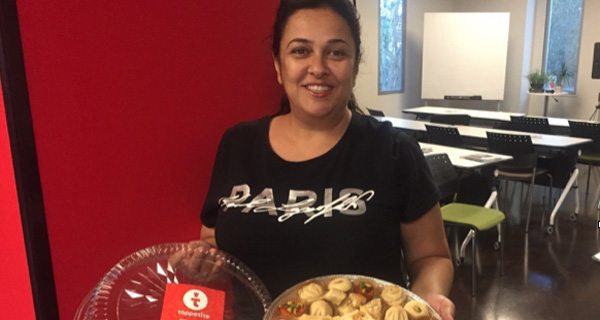Twenty-three years ago, Kay Diggs immigrated to the United States from the Middle East with the intent to pursue an education, become financially independent and provide for her kids. Diggs pursued a career in medicine, but as a single mother of two, knew she needed more time at home.
With a knack for baking, Diggs thought of opening her own bakery to generate a steady income, but the thought of working from 9 a.m. to 5 p.m. and away from her children didn’t appeal to her.
Diggs decided she would get a state license and start baking from home. However, finding customers was a constant struggle. She began to wonder how she would find consistent customers interested in buying her products. Thus, Diggs vision for Tappetite was born.
Tappetite is a digital, peer-to-peer marketplace for bakers to sell their homemade goods locally. A peer-to-peer marketplace allows suppliers or vendors to sell their products or services to consumers, in contrast to the traditional business model, where one institution provides various products to various consumers. In a peer-to-peer marketplace, every consumer can also be a vendor; the communication between the provider and consumer is direct.
As Tappetite founder, Diggs wanted to empower other stay-at-home bakers seeking to be financially independent. Her mission is to provide a reliable and modern marketplace for home bakers, one that connects consumers with easily accessible products, and sellers with a platform to lend their services.
With technological advances in constant motion, peer-to-peer business models are becoming increasingly popular. Apps like Uber, which allows regular car owners to operate like taxi drivers; Etsy, an app used to buy or sell handmade or used goods; and OfferUp, used to make buying and selling used goods locally simple and direct, are flooding the market.
Charles Giles, professor of practice in the marketing department of the W.P. Carey School of Business, classifies the business model under a sharing economy, or bringing people that might have a need together and doing it in the most efficient way possible.
Though peer-to-peer marketplaces appeal to both consumers and providers because of efficiency and lower price points, there are certain hurtles that must be jumped before a peer-to-peer business can truly take off.
“It’s all about reputation. As a business owner, how do I get 5,000 sellers for my marketplace if I’ve got no buyers? And how do I get my buyers to buy something if I have no market for the product?” said Giles. “You have two markets that you have to understand, and between [the buyer and seller], how you are going to get both to buy in.”
Tappetite launched at the start of the year, with a campaign to help 21 female Syrian refugees start careers as home bakers. Diggs has worked with International Rescue Committee to help these women earn food handler’s licenses and begin selling their goods through the Tappetite website.
“When the refugees come here, especially women, they desperately need a job. But if they can’t speak English or can’t work as much as they need to, it’s hard for them to support themselves,” Diggs said. “Some of them are single mothers. Many of them have big families and one income isn’t enough. Resettlement helps them for a few months, but after that, they’re on their own.”
Staci Lichterman, founder of her business Pop Culture Travel and a recent customer of Tappetite, chose to purchase from the site when she realized she’d be supporting families adjusting to their new lives in the United States. She also believes the app will introduce Syrian culture to a society who’s rarely exposed to it.
“As much as we hear a lot about Syria as a place, we don’t hear much of anything about the culture,” said Lichterman. “But everybody eats. So, having the opportunity to learn about culture through food is an amazing benefit.”
Diggs, being Middle Eastern herself, identifies with these women and works with them closely. She started working with the refugee community when she learned that IRC was having needed volunteers to teach classes for earning a food handler’s license.
“I volunteered to help and I met so many women,” Diggs said. “I wanted them to pursue something that could get them the most money that is available.”
Diggs had the idea for the campaign when she began noticing a pattern. Newly arrived refugees were often participating in bake sells as fundraisers for their families. These are either in conjunction with IRC events or in other areas of the community, like local churches.
At first, IRC volunteers or church members are excited to support refugee families and purchase the goods. Eventually, however, the excitement from these “customers” dies down, especially after refugee families are months past resettlement. Diggs goal in the campaign is to connect these women directly with paying customers.
“This way they have sustainable income, not just a volunteer that’s excited for a while,” Diggs said. “Tappetite is what they can use when the volunteers disappear. When the bake sales are over, they’ll still have a job.”
Diggs often offers them advice, both professional and personal, and encourages them to think and operate as business owners and entrepreneurs.
“Outside of Tappetite, my role is to be of moral support for them. To encourage them all that things get better.” Diggs said. “I always remind them that eventually they’re not going to be refugees anymore. I want them to set themselves up for success so they can start making a real income.”
Since the campaigns launch, bakers who have sold through the site or at events have grossed approximately $3,000. For now, the food can only be ordered through the site (orders must be placed 48 hours in advance), and then the goods will be delivered to the customers home or event. Diggs says she’s working with the women to soon have the baked goods made to order.
Though there are endless nuances in hosting a peer-to-peer marketplace, Diggs is optimistic for the success of the application. Tappetite goes beyond simply connecting hungry customers with easily accessible, homemade baked goods in a timely manner. Digg’s main concern is empowering people who want to work from home and earn sustainable income. The peer-to-peer app for Android and IOS is currently in development and is set to launch in coming weeks.




